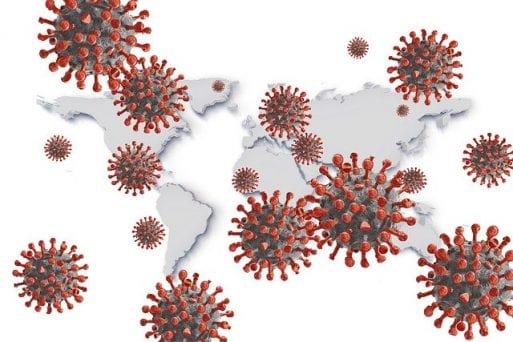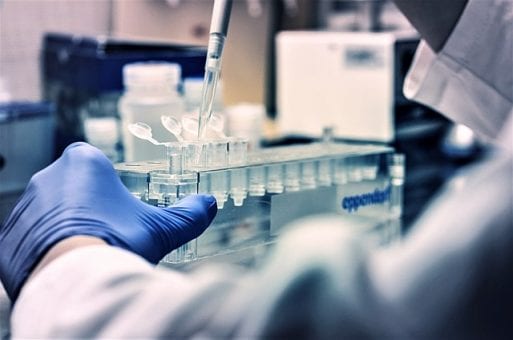
Credit: Gerd Altmann
It’s impossible to turn on the TV or open your internet browser without facing an onslaught of information about the COVID-19 pandemic. It can be overwhelming to try to sift through what feels like an ever-changing stream of facts. There are millions of ways to look at this health crisis, but perhaps the most important question is: When will there be a cure for COVID-19?
Finding a cure for COVID-19 is a two-fold challenge: we need to prevent the disease (vaccination) and we need to cure those who already have it (treatment). Both processes have to do with the structure of the virus.
The coronavirus is so named because of the spiky protrusions on its surface (called S-proteins), which are capped with crown-like rings. It uses these protrusions to break into human cells. Once inside, it begins self-replicating — which is where things start to get dangerous.
The Search for a Vaccine
Vaccines work by imitating a specific virus in order to teach our immune system how to fight it off. To develop an effective vaccine for COVID-19, scientists must create something that can mimic the virus’s structure — S-proteins and all.
Fortunately, this isn’t the first time we’ve seen this type of structure in a virus. Severe Acute Respiratory Syndrome and Middle East Respiratory Syndrome were also caused by coronaviruses with S-proteins. The American biotech company Moderna, which previously worked on a vaccine for MERS, is now testing a COVID-19 vaccine that would simulate a coronavirus infection to trigger a response in the immune system.
Moderna’s vaccine design involves using pieces of the real virus’s genetic code to create something that is ultimately harmless, but similar enough to fool the immune system. Several other companies, such as Inovio and Sanofi, are also working on vaccines using pieces of the virus’s DNA. Others, like Johnson & Johnson, aim to use the virus itself as a vaccine after altering it so that it cannot cause illness.
The Race for a Cure
To create a cure for COVID-19, many scientists are turning to drugs that have been developed to cure other diseases. An anti-malarial drug called chloroquine was shown to improve patient outcomes in China, and a French study has found that hydroxychloroquine, which is used to treat lupus, can be effective when combined with an antibiotic called azithromycin.
An HIV drug called Kaletra is being used as a treatment in China. Favipiravir (also called Avigan), which was originally developed in Japan as a flu treatment, has been shown to shorten the duration of the disease in clinical trials.
Because all of these drugs are already on the market, they could get approved for use with COVID-19 patients faster than new, experimental drugs. Testing a new drug can take years, although this process is now being expedited wherever possible. Remdesivir, a drug that works to stop the virus from self-replicating, is already in Phase 3 of human testing in the U.S.
Another promising avenue for treatment is convalescent plasma therapy. This involves taking part of the blood from a recovered patient and injecting it into an ill patient. Ideally, the antibodies that were developed when the recovered patient fought off the virus will cause the sick patient’s body to create more of the same.

Credit: Marta D.
How Long Will it Take?
Under normal circumstances, all new drugs must go through animal testing, followed by three phases of human trials with increasingly larger sample sizes. This can take as long as a decade, and with good reason; testing the long-term effects of a medication is, by nature, a time-intensive process.
However, because a cure for COVID-19 is so urgently needed, this process has been fast-tracked as much as safety will allow. Moderna has skipped animal trials and begun human testing with its possible vaccine, and Gilead Sciences is currently on the last phase of human testing for its treatment drug, remdesivir.
Anthony Fauci, the director of National Institute of Allergy and Infectious Diseases, has stated that it will likely be another 12 to 18 months until a vaccine is ready for the public. However, many experts have cautioned that this estimate may be overly optimistic, since there are elements of the testing process that simply can’t be rushed.
There’s a lot that we don’t know about COVID-19, and it’s still unclear what an effective treatment (or vaccine) will look like. In the meantime, the most effective defense against COVID-19 is to follow the guidelines laid out by the Center for Disease Control, which include social distancing, washing your hands, and staying home if you are sick.

 Scientists Are Testing Cures for COVID-19
Scientists Are Testing Cures for COVID-19


 First the Wealth Gap, Now the U.S. Has a Growing Health Gap
First the Wealth Gap, Now the U.S. Has a Growing Health Gap
 How to Comfort A Dying Loved One
How to Comfort A Dying Loved One
 Our Annual Seven Holiday Gifts for Someone Who Is Grieving, 2024 Edition
Our Annual Seven Holiday Gifts for Someone Who Is Grieving, 2024 Edition














